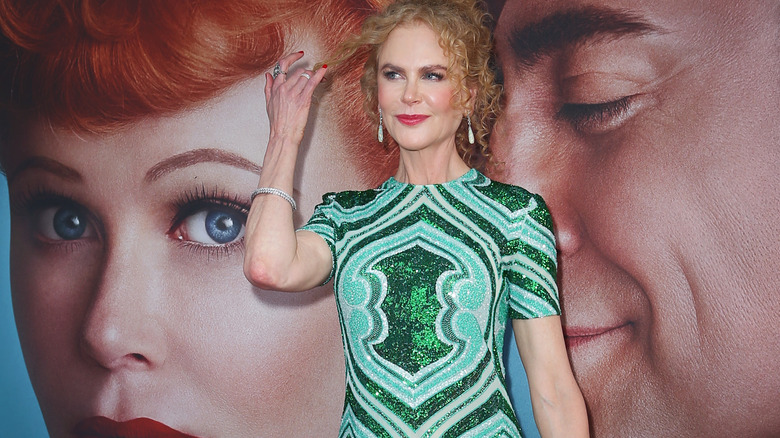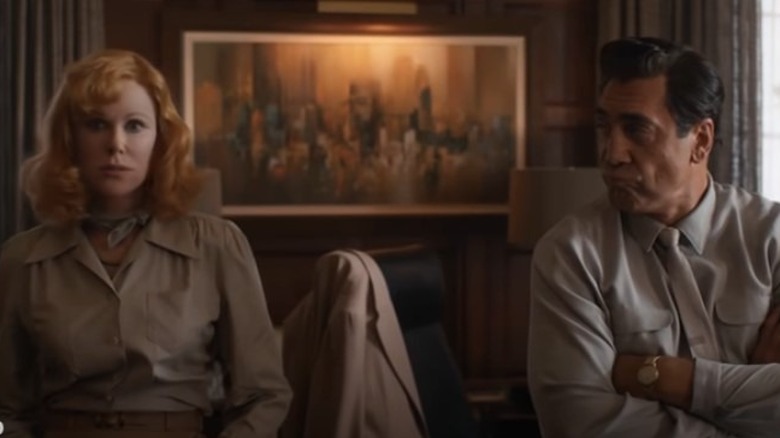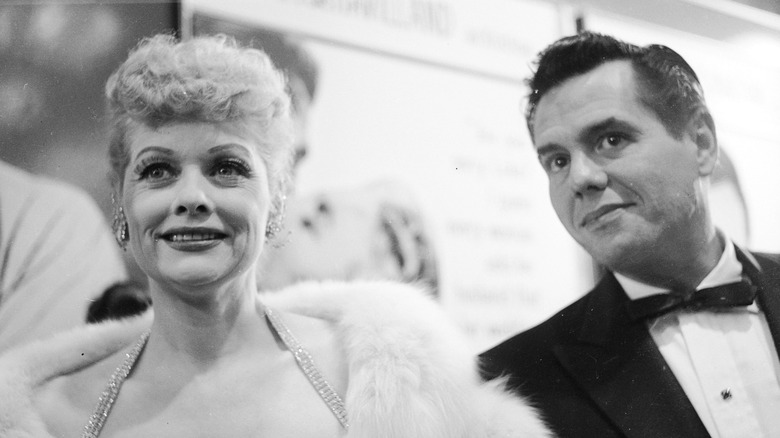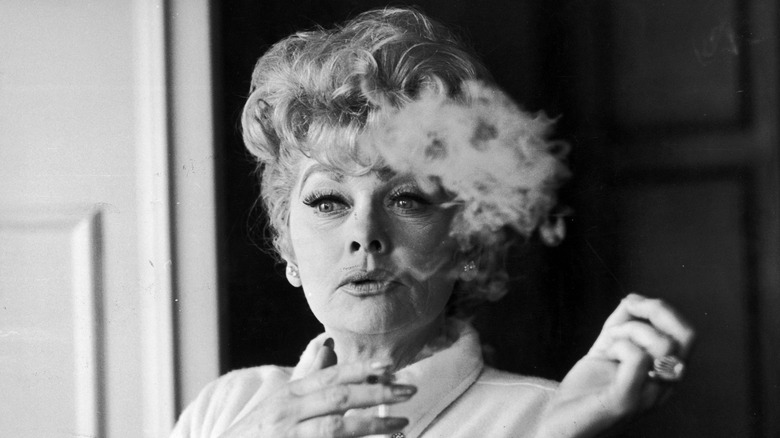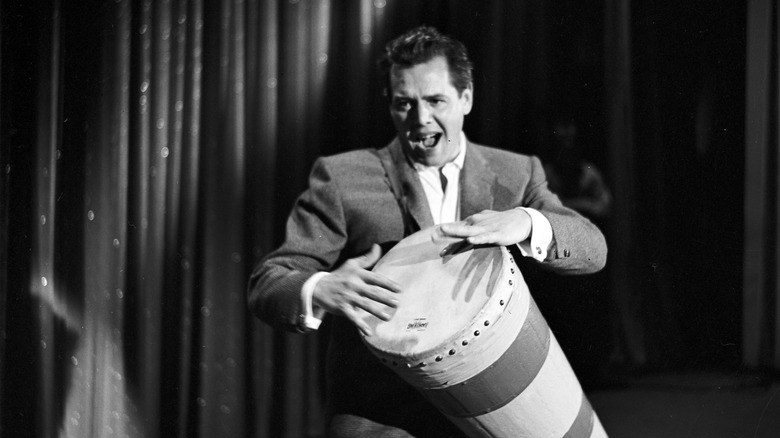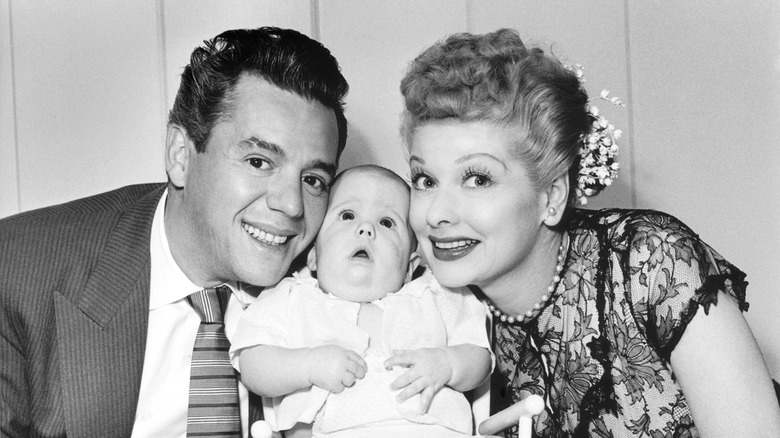5 Times Being The Ricardos Lied To You
Director Aaron Sorkin's new film, "Being the Ricardos," was a bit controversial from the get-go. Fans were particularly upset about the casting choices earlier on, especially about the decision to bring Nicole Kidman onboard to play Lucille Ball. Now that the film (and Kidman's performance) is generating Oscar buzz, per Gold Derby, it's fair to say Sorkin wasn't that wrong.
To make the film more engaging for the audience, Sorkin took a number of liberties in addition to the casting. Some of these included "stretching the truth" a little bit in several areas — simply because real life doesn't always translate well to the screen. The real world is, well, usually slower, and to create an engaging movie, you'll need to add, delete, embellish, and sometimes just plain lie.
Not that Lucille Ball's wasn't interesting enough and filled with both professional and personal drama. She was the first pregnant actress to not hide her pregnancy on a TV show and the first one to be part of an interracial TV marriage — both very controversial at the time. Still, there are several big differences between the movie and the real story of Lucy and Desi Arnaz's marriage.
Not everything happened in one week
"Being the Ricardos" looks at one crazy, dramatic week in the life of Lucille Ball and Desi Arnaz in 1952. In the film, three major events take place during this week: Lucille Ball's second pregnancy and her groundbreaking decision to show it on TV, the accusation that she's a communist, and what happens when Ball is confronted with Arnaz's infidelity after reading an article about it.
While these three things did happen in real life, they didn't exactly happen as portrayed in the movie. For starters, they didn't even happen in the same year. Ball's second pregnancy occurred during 1952 but later in the year than depicted in the film, and Desi Arnaz Jr. wasn't born until January 1953 (via Cheatsheet). Despite what the movie tells us, Ball's big hearing about her connections with the communist party didn't happen until later that same year in real life (per Distractify).
Then there's the story of Desi's affair. It was actually 1955 when the Confidential tabloid reported that Desi had been caught with a sex worker. In the movie, this appears to be a big shock to Ball, but the truth is that she'd been aware of Desi's "indiscretions" for a long time (per Vanity Fair). Desi didn't even try to hide this very well. As reported on Vanity Fair, he once allegedly told a friend, "What's she upset about? I don't take out other broads. I just take out hookers."
Ball's communist accusations didn't just happen once
The early 1950s were marked by a period of paranoia known as the "Red Scare," where the House Un-American Activities Committee (HUAC) started conducting hearings to find people with possible Communist Party ties. In Hollywood, these included big names such as Walt Disney, Gary Cooper, and yes, Lucille Ball (via History Hit).
In the movie, Ball is "declared" a communist by gossip columnist and radio news commentator Walter Winchell during a live expose. This seems to come as a surprise to Ball in the movie, but in real life, she had been dealing with these accusations for a while by the time Winchell went on record about it, as reported by Esquire.
By then, she had already had a trial in front of the HUAC (and one more was to come), where she'd been asked about her association with the Communist Party. While the movie seems to imply that Ball's relationship with the party was very casual and new, the truth is that she had actually registered to vote as a member in 1936 — she later claimed it had only been to please her grandfather (via The Washington Post).
J. Edgar Hoover, who was the FBI director and also a big fan of the couple at the time, cleared Ball after a second trial. By the way, the movie tells us Hoover himself called the show at one point, but there's no record or proof that this ever happened.
There were rumors about Ball, too
The marriage between Lucille and Desi had been rocky for a very long time, mostly due to Desi's infidelities over the yeas. In the mid-'40s, just a few years after their marriage, Ball had even filed for divorce because of Desi's behavior. However, it was mostly a ruse, and she canceled the paperwork almost right after, according to Vanity Fair. The rumor continued, though, and included stories about romances with Lana Turner and Betty Grable (via Express).
While "Being the Ricardos" talks about Desi's behavior at least some, there's no mention of the rumors that plagued Lucille as well. The biggest one was connected to Ball's long-running on/off relationship with Henry Fonda. Reportedly, the two dated very casually early in their careers but, rumors say, continued to meet occasionally — even after Ball got married. Years later, Fonda would say that "Lucille was the love of his life" (as quoted by Express).
There were also rumors Ball had a number of other lovers, mostly to occupy her nights when Desi was on the road with his band (potentially cheating as well). Over the years, she was linked to big names like Robert Mitchum, William Holden, and Orson Welles.
Desi's family was not kicked out of Cuba by the Bolsheviks
When asked about the couple's potential communist sympathies, "Being the Ricardos" tells us the Bolsheviks confiscated the Arnaz family's properties and caused them to flee Cuba. But the Bolsheviks — a radical left communist faction founded by Vladimir Lenin — are better known for bringing down the government in Russia during the 1917 revolution, rather than for their presence and political power in Cuba (via Britannica).
We're not sure why director Sorkin decided to mention the Bolsheviks in the movie, but it could have simply been because they are well-known and including their name paints a very specific picture of how things could have happened.The truth, however, is that communism and socialism didn't arrive in Cuba until the 1959 Cuban Revolution (per History) — long after the Arnaz family had escaped Cuba in 1933.
The true story goes something like this: Desi's parents were both well-educated, wealthy people, and his father was even the mayor of Santiago at the time the 1933 revolution against the corrupt government of President Gerardo Machado broke out. As a result, the family's many properties were either seized or burned to the ground and Desi and his mother escaped to Miami while his father was sent to prison (per Distractify).
It wasn't Desi's idea to do an on-screen pregnancy
In the movie, we see Lucille Ball and Desi Arnaz sitting in an office with the show's writers, with Desi telling them "Lucy Ricardo will be pregnant in the show." There's a feeling of horror and dismay among the writers, who insist Lucy being pregnant will make the audience ask "how did she get that way" — and you could not have a family show even suggest the idea that their characters were, well, having sex.
The movie then goes to show executive producer Jess Oppenheimer's very similar response, followed by the argument that the network will certainly not allow this. Desi, of course, ends up winning this battle for the couple and Lucy becomes the first openly pregnant character on TV. Putting Desi in charge of fixing this problem in the movie is likely a way to portray Arnaz as a savvy businessman — something that he clearly was, just not in this particular occasion.
According to Lucille Ball's autobiography, the whole thing wasn't Desi's idea. In fact, when the couple went to Oppenheimer's (not the writers') office with the news, they announced that the show would have to be canceled. But then, Ball says in her book, it was Oppenheimer who came up with an idea. "I wouldn't suggest this to any other actress in the world — but why don't we continue the show and have a baby on TV?" (via The Detroit News).
